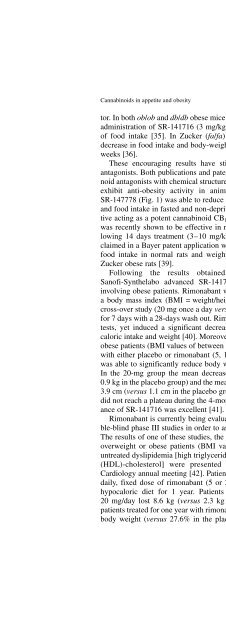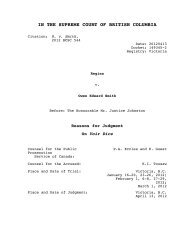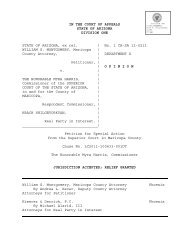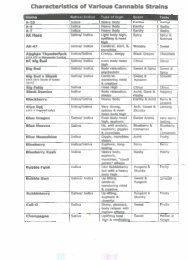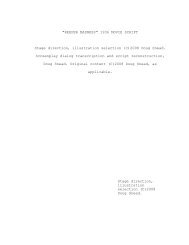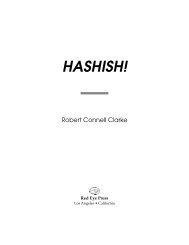3. Umbruch 4.4..2005 - Online Pot
3. Umbruch 4.4..2005 - Online Pot
3. Umbruch 4.4..2005 - Online Pot
Create successful ePaper yourself
Turn your PDF publications into a flip-book with our unique Google optimized e-Paper software.
Cannabinoids in appetite and obesity 223<br />
tor. In both ob/ob and db/db obese mice with unrestricted access to food, acute<br />
administration of SR-141716 (3 mg/kg i.p.) produced a significant reduction<br />
of food intake [35]. In Zucker (fa/fa) rats, SR-141716 induced a transient<br />
decrease in food intake and body-weight gain when administered orally for 4<br />
weeks [36].<br />
These encouraging results have stimulated the search for cannabinoid<br />
antagonists. Both publications and patent literature suggest that new cannabinoid<br />
antagonists with chemical structures distinct from that of SR-141716 may<br />
exhibit anti-obesity activity in animal models. The pyrazole derivative<br />
SR-147778 (Fig. 1) was able to reduce sucrose consumption in mice and rats,<br />
and food intake in fasted and non-deprived rats [37]. A new imidazole derivative<br />
acting as a potent cannabinoid CB 1 inverse agonist (Fig. 1, compound 1)<br />
was recently shown to be effective in reducing body weight in DIO rats following<br />
14 days treatment (3–10 mg/kg p.o.) [38] . Similar compounds are<br />
claimed in a Bayer patent application which describes significant reduction in<br />
food intake in normal rats and weight loss following chronic treatment in<br />
Zucker obese rats [39].<br />
Following the results obtained in animal models of obesity,<br />
Sanofi-Synthelabo advanced SR-141716 (rimonabant) into clinical trials<br />
involving obese patients. Rimonabant was tested in obese male subjects with<br />
a body mass index (BMI = weight/height 2 ) of >27 kg/m 2 in a double-blind<br />
cross-over study (20 mg once a day versus placebo). The patients were treated<br />
for 7 days with a 28-days wash out. Rimonabant had no effect on taste and spit<br />
tests, yet induced a significant decrease in hunger (visual analogue scale),<br />
caloric intake and weight [40]. Moreover, in a subsequent study involving 287<br />
obese patients (BMI values of between 29 and 41 kg/m 2 ) treated for 16 weeks<br />
with either placebo or rimonabant (5, 10 and 20 mg once daily), rimonabant<br />
was able to significantly reduce body weight as well as waist circumference.<br />
In the 20-mg group the mean decrease in body weight was <strong>3.</strong>8 kg (versus<br />
0.9 kg in the placebo group) and the mean decrease in waist circumference was<br />
<strong>3.</strong>9 cm (versus 1.1 cm in the placebo group). The observed decrease in weight<br />
did not reach a plateau during the 4-month duration of the study and the tolerance<br />
of SR-141716 was excellent [41].<br />
Rimonabant is currently being evaluated in multi-centre, randomized, double-blind<br />
phase III studies in order to assess its efficacy and long-term safety.<br />
The results of one of these studies, the RIO-Lipids trial, which enrolled 1036<br />
overweight or obese patients (BMI values between 27 and 40 kg/m 2 ) with<br />
untreated dyslipidemia [high triglycerides and/or low high-density lipoprotein<br />
(HDL)-cholesterol] were presented at the 2004 American College of<br />
Cardiology annual meeting [42]. Patients were randomized to receive either a<br />
daily, fixed dose of rimonabant (5 or 20 mg) or placebo along with a mild<br />
hypocaloric diet for 1 year. Patients treated for 1 year with rimonabant<br />
20 mg/day lost 8.6 kg (versus 2.3 kg in the placebo group). Over 72% of<br />
patients treated for one year with rimonabant (20 mg/day) lost over 5% of their<br />
body weight (versus 27.6% in the placebo group). Moreover, 44.3% of the


